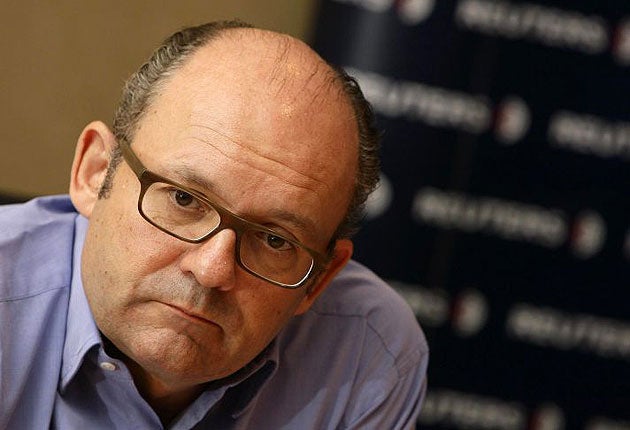Does ICAP’s Michael Spencer deserve to be the poster child for everything wrong with the honours system?
The City mogul has become a political tool for enemies of David Cameron, but there are better examples to illustrate what's wrong with a bankrupt system

The controversy over David Cameron’s honours list full of chums has taken a new twist with the news that it has been blocked as a result of his attempt to hand a peerage to former Tory Treasurer Michael Spencer.
The stumbling block is the involvement of ICAP, the business he founded and runs, in the Libor interest-rate fixing scandal.
It isn’t the first time Mr Cameron has tried to reward a man who is one of the party’s biggest donors and most successful fund raisers. His proposed peerage has been blackballed by the independent advisory committee responsible for overseeing the granting of titles on more than one occasion.
However, this time it matters, not least because of a growing clamour of criticism over the way the United Kingdom distributes baubles.
The issue has shot to prominence thanks to vexed question of Sir Philip Green’s knighthood and whether he should be allowed to keep it in the wake of a scathing report into his handling of the sale of failed retailer BHS, and his stewardship of its troubled pension scheme, by two Parliamentary committees.
Because of that, Mr Cameron’s attempt to festoon his friends with various fancy titles has poured a can full of petrol on top of a fire already burning hot.
Enter Mr Spencer as the poster boy for everything that is wrong.
Is that fair?
Let me state for the record my fierce opposition to the way the honours system works. It seems to exist solely as a mechanism for the establishment to pat itself on the back. To award the friends of, and donors to, whichever party is in power. If there’s a sop to the public it comes in the gongs handed out to sporting and cultural figures of renown, together with the odd minor medal for local worthies.
That said, there would seem to be better examples to use than Mr Spencer for what has gone wrong with the system. Start with Rolf Harris and continue on from there.
There is no doubt that the £54m ICAP, which brokers deals between banks, was fined over the Libor scandal represents a black mark against him.
However, when compared to what people employed by the big banks were doing the three ICAP brokers who brought the hammer down on the company were relative small fry. Mr Spencer, as the man in charge, still deserved the heat he took over the affair. As the chief executive he could and should carry the can. However, no one has ever questioned his personal conduct and he was a lot quicker to take responsibility than some of his City peers.
Take a cursory look down any honours list and you will likely find businessmen whose conduct could be considered morally questionable.
So let's compare Mr Spencer with one of them; the aforementioned Sir Philip. Mr Spencer built his businesses from the ground up. He started ICAP in a small room with a couple of screens and took it into the FTSE 100 and around the world.
The latter shot to prominence chiefly through doing deals. Mr Spencer too has done a lot of those too, but I'd give him the entrepreneurial edge.
He also lives and is domiciled in Britain. I’ve no doubt he employs some clever accountants to help him with his tax, and he’s been involved in a number of scrapes during his business career. It goes with the territory.
Sir Philip, by contrast, infamously calls the tax haven of Monaco home, and he and his family operate a complex network of companies domiciled in other tax havens such as the British Virgin Islands, when he’s not gallivanting around London with supermodels on his arms.
And yet Sir Philip has a “K” while Mr Spencer is everything that is wrong with the honours system
The latter's misfortune, of course, is that he appears to have become a convenient political tool with which to damage Mr Cameron, and by proxy, the Remain campaign, many of whose leading lights are on the former PM's list.
The irony being, of course, that Mr Spencer largely kept his head down during the referendum. I’m told he was genuinely torn over the decision, although I wouldn’t pretend to know which way he voted.
If the Government is genuinely interested in shoring up the City’s position as a global financial centre in the wake of Brexit, someone like Mr Spencer would be handy to have around the House of Lords, particularly when it comes to scrutinising any Leave legislation.
Business news: In pictures
Show all 13The publicity he’s getting seems destined to doom that. Well, he's a big boy, and a big political donor when money should be kept out of politics.
We'll be here again while its sloshing around – money, success, fame, they’re never enough. Those that achieve them seem to feel that they have to have a public pat on the back too.
The Government will probably now set up some sort of commission to investigate “reform”. It’ll recommend some tinkering without really changing anything and for that its members will be handed honours of their own. Perhaps Mr Spencer will have spent enough time in purdah to join them by the time their work is done.
Subscribe to Independent Premium to bookmark this article
Want to bookmark your favourite articles and stories to read or reference later? Start your Independent Premium subscription today.

Join our commenting forum
Join thought-provoking conversations, follow other Independent readers and see their replies